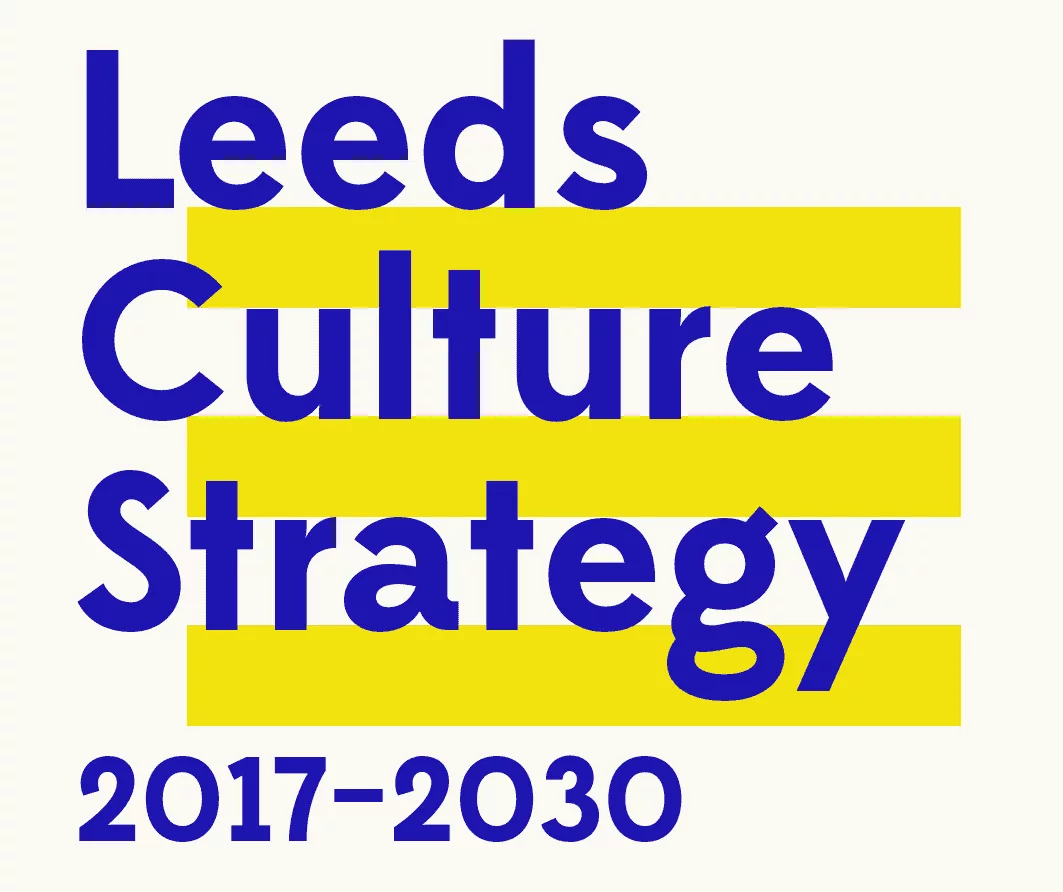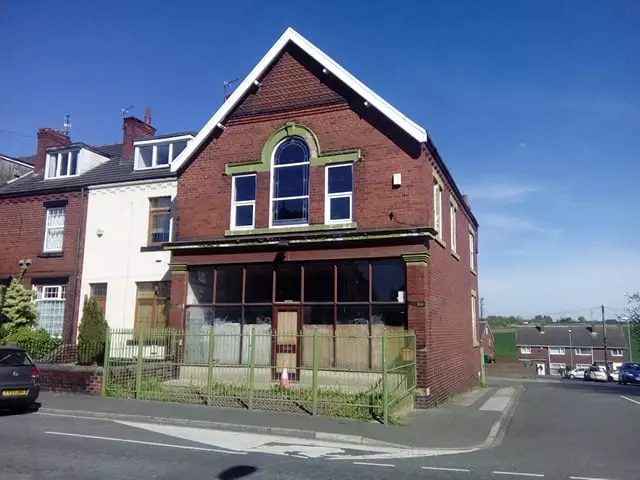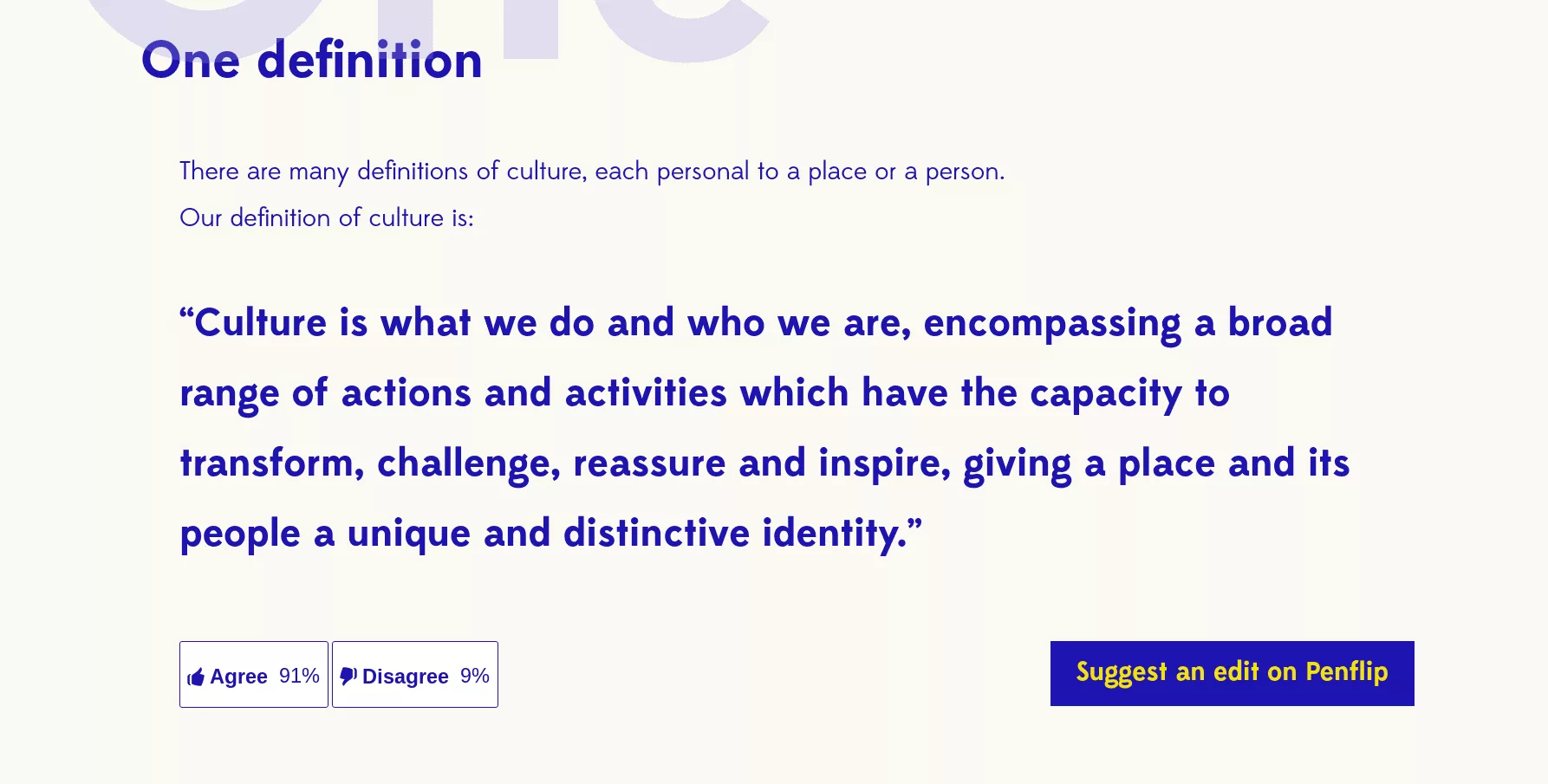
“What do you think about this?”
“What is it?”
“It’s a cultural strategy… for Leeds.”
“What’s that when it’s at home?”
“It’s about Leeds… how it could change, could be made better. About the role that culture could play… What do you think about culture?”
“Think about culture?”
“Culture… any comments?”
“Comments?”
“Here, look. Anyone can comment. They really want to know what you think.”
“I think… Look at the state of those daffs. Better get them sorted. Be seeing you…”
I was visiting mum again yesterday. She lives in Leeds City Council supported housing in a small village in South Leeds. It has a Wakefield postcode, which locals consider diverse. Over the road from her bungalow there’s a thriving community centre surrounded by neat, tidy semis. The streets adjacent are blocks of back to backs, well-kept, unlittered, welcoming. It’s not an easy place to get to by public transport so most people need a car, and there are few amenities. The only shop within a mile is the chemist. The locals joke that it’s easier to get an anti-depressant around here than a pint of milk. But people can’t half talk.

Frequently you’ll get stopped in the street to listen to a random stranger air an opinion on anything from the local bus service (they don’t have a good opinion), the council (don’t get them started!), the opening hours of the chemist shop (do they really need such a long lunch break?) to the state of the flower beds on the street corner (what will they do now Harold is too ill to maintain them in all their extravagant splendour? Everyone knows Harold is an impossible act to follow.)

Yesterday I left mum’s with a good ten minutes before the bus was due. I always factor in the couple of “hello, how’s she diddling”‘s and the inevitable collaring from a neighbour with a tale to tell. This neighbour was leaning on the community centre wall chatting with a young lad on a bike. He turned to me and launched into one of his favourite topics.
“There’s bugger all round here for the kids to do.”
And he went on to point out all the surrounding fields and woods and neglected places that had recently been developed into acres of private housing.
“There’s not a park or a football pitch. And they may as well put a gate around it for all these kids are welcome.”
I nodded. I’ve often heard him go into a long lament about “when I were a lad” (he’s actually not much older than me!) so I thought I’d try to steer the conversation into a more productive direction. Or distract him at least.
Which is when I brought up the Leeds Cultural Strategy. Step Two: Share this with your friends, family and colleagues… and, I assumed, the odd person you bump into walking along mum’s street?
I remembered I’d read something in there about public spaces and young people. But by the time I’d found it the lad on the bike had whizzed away and the neighbour was fussing over some flower pots.
I pointed to the passage on my tablet and tried to talk about cultural strategy.
I admit I hadn’t properly digested the whole thing. It was only published that morning. And I wasn’t fully prepared with all the facts at my fingertips. It didn’t go as well as I’d hoped. I thought on the bus all the way home about why my attempted strategic cultural conversation had been such a car crash, and I came to a conclusion.
It had nothing to do with the idea. I think it’s a bloody great idea. Trying to involve people in developing cultural strategy is grand.
It had nowt to do with the document itself. It looks great and it sounds genuine (though can’t resist quoting a bit:
Our cultural product has the potential to be one of our greatest exports, and propositions for inward investment.
You don’t hear much talk about cultural product and inward investment on the 47 bus. Trust me, I tried. I got funny looks in Belle Isle and almost turfed off in Hunslet.)
I think the problem is that most of us don’t connect the things we do in our everyday lives with the word “culture”. So the definition of culture in the strategy

isn’t what most people have in their heads when you bring the subject up. I know I don’t (and I’ve been doing this damned “culture” website for years, so if I don’t naturally think that way, who does?)
Most people I talk to in mum’s village would understand at some level transport strategy and be willing to offer comments about improvements. Most would get driving a bus. But most people don’t see themselves as producers of culture. It’s something done to them. So asking them to contribute to cultural strategy is a big ask.
I have to admit, I’d find it hard to summon up the confidence to “Penflip” the strategy document.
Again, that’s not a criticism or a reason not to do it.
But it’s going to be bloody hard! Good luck!
Ha bloody hard just about sums it up, though had you spoke to me some days in the last 18 months the expletive might have been a bit stronger…
The big challenge of writing a culture strategy is that the words ‘culture’ and ‘strategy’ aren’t in most people’s everyday language and they aren’t words that people are comfortable with or relate to them. The definition was hard, maybe your conversations will give you some ideas to add to the edits (go on, be brave!)
Once you get people talking about what they do in their spare time or things they do that they don’t have to do, they are far more cultural than they knew or strangely would like to admit – it’s this last bit that we need to overcome. Why don’t people like to admit that they are cultural or like culture or appreciate art? Even though they are and do all of things? Where does that embarrassment come from?
I then made it harder by saying we would ‘co-produce’ and be ‘iterative’ which if that isn’t your world can sound like something that doesn’t include you or worse still Emperor’s New Clothes, after all it’s still strategy isn’t it? Those words relate more to how we’ve tried to create it not what’s in I – not being the know-it-all with all the answers from the start wasting your time asking what you think when we’re going to tell you in the end. Maybe that’s not always been clear or easy for people to get their heads round or even trust.
And then, yes of course, a little council speak found it’s way in there too, for those who like a good game of buzz word bingo.
I hope you do find the confidence to add your thoughts and edits to penflip as how this is communicated and the language we collectively use will hopefully in time make this feel like it does belong to the people on your mum’s street and that they can add to it and change it too, but it will take voices like yours to help it become that.
“Culture” and “strategy” are such off-putting words – though “iterativity” is in a league of it’s own. It sounds like something that happens in a Dalek repair shop.
I don’t know why people don’t like to admit they do culture. But I do know how hard it is to get them to commit something to writing. It’s what I’ve been doing here for years… the only thing that works is beer and bribery. Could that be part of the strategy?
Culture and strategy are both labels that we use to appropriate and professionalise innate human instincts and behaviours. To codify them, control them and manipulate them for profit, or inward investment.
My favourite definition of strategy involves ‘the emergence of identity’ or ‘becoming what we really are’. And culture is about the agglomeration of values and behaviours. Often culture strategies privilege some of these values and behaviours over others (art over tending flower beds for example). In their attempts to ‘lead culture’ they often distort the emergence of identity, try to make us something we are not.
My perfect cultural strategy would be to shut up, listen, and help where I can. Staying in touch with purpose (culture for inward investment? REALLY? or for self expression, communication and developing identity and connection?) and going where the real energy is. Now the sharks and the boomers have sniffed the money they will push their way to the front…and the stickers and the gardeners risk being overlooked again.
Brilliant piece Phil. And all power to Leeds Culture and its strategy. Let’s do our best to support the stickers and the gardeners over the boomers and the sharks…
Hi Leanne, I think the embarrassment you mention comes from the term ‘culture’ or ‘cultured’ being often associated with the notion of art being highbrow, inaccessible, stuffy, exclusive, and people feeling they are being looked down upon by some sort of superior clique if they don’t understand or like it.
Although the way you rightfully define culture as being something that is inherent in our collective identity from our roots up – the product of history and diversity – I think many still regard the word ‘culture’ as being something completely the opposite – a glaring example of the divide between the haves and have nots, condescending and snobbish, and I think that’s where the embarrassment stems from.
I’m not sure I can offer any ideas to form a solution or a way around it, I’m no expert, I’m just interested in it from a bystander’s point of view. I enjoy witnessing the relationship between history, context, and self expression.
I think the document is definitely moving in the right direction and lays out some positive changes. I particularly like the idea of an app that gives young people free access to transport and events, as this opens up experiences to them which they otherwise might not be able to afford. I think participation in cultural activities must be made inviting and affordable to everyone (not just those that can afford it) if Leeds2023 is to bridge the economic divide between north and south Leeds, not exacerbate it. The playing field must be made more level.
As you were….
Hi Phil
I was interested in your look at the Leeds Cultural Strategy Consultation from a south Leeds view point but obviously, it told only part of the story so I asked Roger J. C. bayonet of the Roundhay Irresponsible to give his view from this prestigious and vibrant north Leeds suburb.
Here’s what he had to say.
Up here in Roundhay we are in principle 110% behind the inspiring Leeds 2030 European Capital Culture Bid and all the progress along the way which will be needed to make it happen. Although as I will show there are some major things wrong with it, overall in terms of improving the cultural offer It can only make things even better for us up here in north Leeds.
Having said this of course, Leeds’s Cultural Strategy works well for us already with The Graduate at the Playhouse and Turandot coming to the Town Hall. So, normally we wouldn’t have bother with consultations because either the policy makers are people like us and share our tastes or these people recognise we are the people who matter economically and socially to the city so automatically put on things we like. Of course, if the Council suggests some crazy scheme like putting Go Ape in our local park naturally we rebel.
Of course, the strategy is written in the contemporary language of policy words that read well if you can get over the jargon but appear often utopian and attempt to be value free. Of course, this is not the case. This leads me to the major proviso with the whole thing and that is that we need to get over this notion of more means better and all culture is of equal value. We must reject the PC notion that this is all about inclusivity and that all the outputs of cultural practice are of equal worth. This is dangerous nonsense as I will go on to explain.
Of course, here in our vibrant and highly priced community we regard ourselves as inherently cultured as many of us have been to elite universities and were privately educated. As cultural consumers, we make the make up a large proportion of the audience for the city’s major cultural attractions but this idea that place matters and that having a good cultural policy will make Leeds somehow unique and distinctive is wide of the mark. People like us know that Leeds being what it is we will still have to journey regionally, nationally and even internationally to imbibe the best that has been thought and said. Nonetheless we are pleased that Leeds is trying to in a small way catch up with what is available widely elsewhere such as in the recent International Festival.
We are again up for the major tenet of the strategy which is to see artists and creatives respected and valued economically. There are quite a few creative types living up here and of course their professional contribution is only the tip of the iceberg in terms of semi-professional and amateur artists offering their works through the recent Open Studio’s initiative.
We would be at a bit of a loss to say how culture might serve to narrow the gap between rich and poor which unfortunately continues to blight our fine city. After all culture cannot build new houses or provide medical services.
A widely shared definition of culture round here is one which sees a clear distinction between culture in the sense of the Arts and everyday life and its exemplification in” Popular culture”. One should not really seek to merge the two since there are inevitably distinctions of quality and taste involved which suggests that any strategy based on public money should concentrate on providing only the best not that which appeals to the mass. So, the strategy as it is now works reasonably well for us since to book a box at the grand for a season’s opera really is affordable compared with our golf club fees.
One cannot escape the fact that cultural values must be learned they are not inherent and up here we tend to believe that some people are capable of this learning if they are given the opportunity and some people sadly are not. So, we would not go along with the idea that cultures except in the lowest common denominator sense can be created and experienced by anyone; people in general need the benefits of a quality classical grammar school education to appreciate what culture really means to the human spirit. Popularism is not what we should be about.
So, we can say that parameters must be set around the risks which can be taken around what can be promoted by the cultural strategy: some contemporary art is complete rubbish of course. Curiosity and generosity are fine in so far that is again up to our curators to decide for us based on their superior knowledge and experience what it is appropriate to be curious about and what direction our already substantial philanthropic contribution should take. Likewise, in our view respect is about respect for values which are enduring and secure not anything goes.
Nevertheless, it is true to say that having a solid and traditionally orientated cultural offer can reinforce the best of British values as is shown in events like Armed Forces Day.
Much of the remainder of the strategy looks a little utopian or at worse vacuous – we must to be frank that the quality of civic leadership in the city does not inspire confidence that the city will ever become “known nationally and internationally as a thriving cultural hub” – that’s why when I want to hear a classical concert in a hall with decent acoustics I must to go to Gateshead, Manchester or Birmingham. The city is best when it follows its natural instinct to be insular and inward looking and since this is such a deeply embedded feature of its cultural make up that fortunately, it is unlikely to change: “fast paced” and inviting to the world, no, no, no.
Likewise, when the Council’s focus is on supporting major shopping malls it seems unlikely that “our high streets will be reinvented” to provide live/work spaces galleries and independent food outlets in the way which is described. This might provide and interesting cultural offer for middle class people like us but if is going to happen (as it has in our vibrant Oakwood parade) then this will come about through entrepreneurship in the market place not by some council-led strategy.
This argument also applies to creative and tech sector. Looking back at the great age of Leeds’s industrialisation I don’t think they had a strategy, local government policies or structures of financial or educational support except perhaps the Mechanics Institute which was based on the idea of self- help. In this respect, the “strategy” looks back to the misguided days of socialism in this country where people had the idea of “picking winners” and supporting enterprises which were never going to succeed. Who remembers now ICL or Systime computers.
So as with all things we need to look to the past to be our guide as Leeds naturally tends to do and keep things as close as possible to how things are today. The risks associated with radical innovations like the Cultural Strategy more than outweigh any potential benefits and will end up wasting a lot of public money. Sadly, I must reflect that we have cross roads in the cultural life of this country where traditional values and it is these that the Cultural Strategy needs most strongly to reflect if we are going to keep the city going in the right direction
Just a few stray thoughts for you Sour
Kind regards
Bayonet
I thought we were only getting a cultural strategy because all cities applying for the Culture Capital prize have to have a cultural strategy.
True, that’s why we started this now. We had a choice to just tick a box with a standard document about the culture sector, which I don’t think anyone would have questioned or try something different that feels more relevant.
I hope that by doing a strategy that is about the city, it’s issues, challenges & opportunities and doing it in a way that is about genuine engagement (not a consultation on one organisation’s ideas from the start) that it has value regardless of the bid.
Someone gave me a great analogy in one of the conversations that I hope comes true. They said that the bid is like the Premier League, just a milestone towards the Culture Strategy, which is like the Champions League. Football is not my culture (though I’ve had several ‘robust conversations’ that it is culture) so I might have got those the wrong way round!
My point is that although the bid is why we’re doing a Culture Strategy, win or lose if we get the strategy right we should feel like we’ve won anyway. Although it has been tricky getting people to focus on this, most people just wanted to talk about 2023 and generally that’s a happy/exciting conversation not one focused on issues.
Cheers, Leanne. Given that you’ve had to write a strategy, it’s a reflection of your positive personal approach that you’re trying to do it the way you are.
But, as Phil’s bus conversations seem to indicate, we don’t need a strategy. We’ve happily gone about our cultural business forever without one: from ‘Halt! Who Goes Bare’ at the City Varieties, to Friends of Garforth in Bloom, to Casual Violence at Beaver Works.
We don’t need one, but the council does: first, to fulfil the criteria for applying, and second, to give some direction to how it spends public money on cultural stuff. Both of which are fine.
What I fear is that there’s a third reason, which (I think) Chris Nickson is getting at, that seems to be about the council “joining the city up” around “telling its story” of shared “identity” and “values”.
Even with the best intentions in the world, the result will be flimflam.
Ho Ho Ho I love a bit of irony, people caught with their foot in their mouth and a bit of hubris now and again.
Now just remind me which league Leeds United are actually still in after numerous managerial failures – Oh yes the Championship and what happened after they were in the Champions League oh dear me no near bankruptcy and descent to League 1.
Now I know a small city which actually has an unfashionable Premier League, with no realistic chance of the Champions Leagues and which understandably is going for the more modest UK City Culture. I wonder who that could be ?
Ambition is all very well but sometimes it is better to learn to walk before you try to run and the inevitable disaster occurs.
This is culture used as jargon, they same way every term from an official body seems to be used as jargon these days. The vagueness of the definition with the ‘document’ means it actually has no definition at all, beyond being a load of hot air/bollocks (take your pick).
People think of culture as something elitist, and why shouldn’t they? That’s what’s been drummed into them.
But Leeds has its culture, and possibly – far more slippery – its own identity, although good luck trying to define it. Basically, we’re a bunch of Bolshie bastards who don’t like people who think they know something telling us what to do, especially if they sound as if they’re from the south and/or have a side on them. And yes, we’re a city of immigrants, even if it historically takes us a generation or two to accept them.
That’s us, that’s our culture. It’s rough and ready, built on industry that’s long gone now, built on the working class that’s always made up the majority of the population. It’s music hall as much as Shakespeare, a pint of Tetley’s as much as a flat white in a hipster cafe.
We’ve had public libraries and a public art gallery for the better part of a century and a half. Before that we had the Working Men’s Institutes and the like for those who were interested. And those were surrounded by the gin shops and beer shops.
My feeling is that a ‘cultural strategy’ is some committee (once defined as an organism with at least eight legs and no brain) and their idea of what we should be, rather than showing who we are. Maybe the reality isn’t as pretty, but it’s a damned sight more honest.